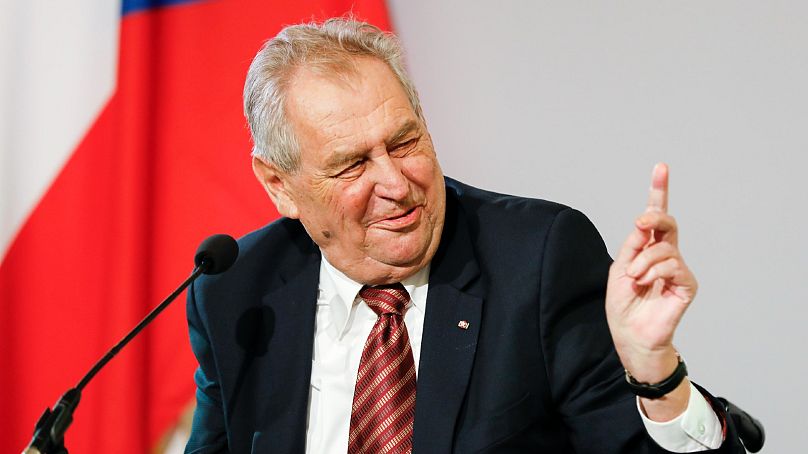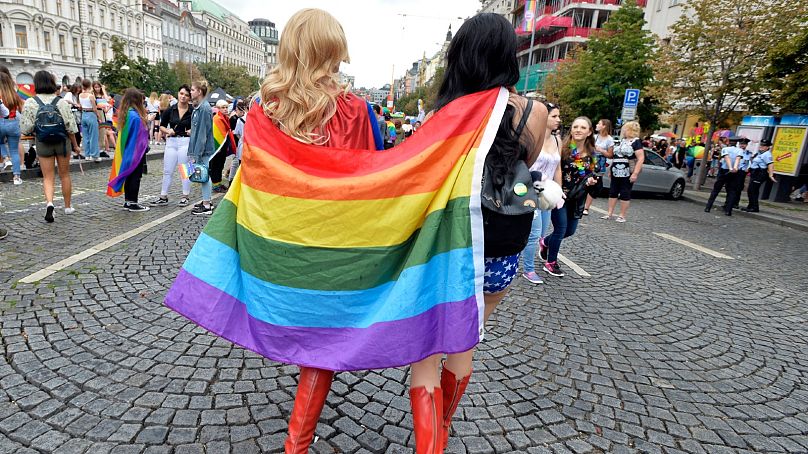Legalising same-sex marriage has broad support among Czechs. But will politicians put a spanner in the works?
“It’s only right that I should have the same privileges as anybody else. I don’t feel different from the next man; I met someone, fell in love, and have a happy, healthy relationship,” says Glenn, a Brit living in the Czech Republic.
 ADVERTISEMENT
ADVERTISEMENT
 ADVERTISEMENT
ADVERTISEMENT
He and his husband, a Czech national, have been together for more than 20 years, but a few years ago they had to travel back to the UK to get married, making do with a registry service in the Czech Republic.
Same-sex couples can currently take civil partnerships, which carry fewer rights than opposite-sex marriages.
That could soon change as a cross-party motion was put to the Chamber of Deputies, the lower house, on 7 June to amend the country’s civil code to allow the marriage of same-sex couples and provide them with the same legal rights as heterosexual couples.
It would essentially do away with registered partnerships that have been legal since 2006 and make the Czech Republic the first country from the former Eastern bloc to legalise same-sex marriage.
It has broad support among the Czech population and from four of the six political parties that sit in the Chamber of Deputies, but previous attempts to introduce a marriage equality bill stalled in parliament for years.
It still remains unclear when the motion will be debated.
President Milos Zeman sought to put a spanner in the works when he said on 8 June that he would veto the law if it was passed by parliament.
But Zeman, known for his controversial comments about the LGBT community, is unlikely to be able to prevent the law from being enacted if it enjoys strong parliamentary support.
What is the proposal on the table?
The proposal, which would amend the civil code, would give same-sex couples the right to marry under the eyes of the state and to enjoy the same rights as heterosexual partnerships.
Since 2006, same-sex couples have been able to live in registered partnerships and have certain rights to inheritance and health care, similar to opposite-sex married couples.
However, the recently-proposed amendments would provide additional rights, including the creation of joint property, inheritance of their partners’ pension, and access to alternative family care. Symbolically, it would give equality to same and opposite-sex couples.
“Both the pandemic and the current crisis have shown the importance of family and legal certainty, which is needed to address the fact that the other registered partner was not entitled to go to the child's hospital and request information about his or her health.” Olga Richterová, the Chamber’s deputy speaker, told local media this month
“If more people want to bear the obligations of marriage, we should support it,” she added.
Richterová, who is also vice-president of the Pirate Party, a member of the five-party coalition government, was one of the four co-sponsors of the motion.
Filip Milde, the spokesman for Jsme Fer (We Are Fair), a coalition of local organisations advocating for LGBT rights, says the proposed amendment will help thousands of same-sex families with children who are not currently full citizens in the Czech Republic.
Last December an amendment failed to pass the Senate, the upper house, which would have forced Czech courts to recognise adoptions of children abroad by same-sex couples. This issue hit the headlines after the famous snowboarder, Šárka Pančochová, adopted the daughter of her American wife but would lose her parental rights if she returned to the Czech Republic.
Currently, local courts recognise foreign adoptions by Czech citizens as long as it “would be permissible under the substantive provisions of the Czech law”. The failed motion in the Senate last year and the latest amendment put to the Chamber of Deputies seek to remove this conditionality. It also applies in some instances to unmarried opposite-sex couples.
In December, the European Court of Justice ruled that parental rights must be recognised in all EU member states without distinction, which includes same-sex couples who adopt abroad.
How LGBT-friendly is the Czech Republic?
The Czech Republic is occasionally ranked behind other countries in western or central Europe on LGBT rights on some indexes. In the ILGA Rainbow Europe’s map of LGBT+ rights, the Czech Republic scored just 26%, behind Slovakia and Hungary.
Yet, homosexuality was decriminalised in 1962 during the communist era, earlier than in many Western European countries. It was decriminalised in the UK four years later.
In 2006, the Czech Republic allowed registered partnerships. A 2016 ruling by the Czech Constitutional Court allowed registered partners to adopt.
A poll conducted by the Median agency in early 2020 found that 67% of Czech respondents reckoned homosexuals should have the right to get married. Some 62% say they should be able to adopt children from institutional care.
Improving the rights of same-sex couples has been a long-time coming. In June 2018, a draft of the marriage equality bill was introduced to parliament. It took lawmakers 1052 days to finally vote on the bill to start the long legislative process, noted Milde, of the We Are Fair coalition.
The bill passed the first reading in May last year but stalled in the committees and died when parliament was dissolved ahead of national elections in October 2021.
“We firmly hope that this time the bill debate will be easier and faster, and our legislators will vote on the bill soon, so the bill can be referred to expert committees for its approval,” Milde said.
The draft was sponsored by a parliamentarian from four of the five parties of the ruling coalition government, as well as by a delegate from the main opposition party, ANO.
Martin Baxa, the Minister of Culture and vice-chairman of centre-right Civic Democrats (ODS), the largest of the coalition government partners, told Euronews that he signed the bill because it “will lead to the full equality of people of the same sex…a strong loving bond between people should be equal for all.”
“I fully respect the fact that there are differing views on this institution and that the cleavage on this matter is across political parties and opinion currents,” Baxa added.
“However, I have decided to express my opinion as a member of parliament directly by becoming one of the introducers of this bill.”
Who is opposing same-sex marriage?
One dissenting voice has come from ODS’ own coalition partner. The amendment proposal was not signed by a delegate from the Christian Democrats (KDU-ČSL), a member of the five-party coalition government that took office in December. As expected, it wasn’t supported by the far-right Freedom and Direct Democracy party (SPD), which sits in opposition.
“We believe that everybody deserves equal rights no matter who they love. But we will not support [a law] to allow same-sex marriage,” said a spokesperson for KDU-ČSL.
“Marriage is an important part of life for KDU-ČSL. Marriage, as a bond of man and women, is a unique bond with the potential of transformation of new human life,” the spokesperson added. “Marriage is a crucial part of [life] for us and its meaning can not be changed, but we want to bring equal legal rights for everybody.”
However, the KDU-ČSL spokesperson said that on laws about ethics the party’s delegates are given a free vote “based on their personal conviction” in parliament.
Most of the other parties, including ODS, which is split on the issue, will also give their delegates a free vote. Marek Benda, chairman of the ODS’ parliamentary club, has opposed the motion in the past. Some members of ANO, the opposition party, are also divided on this question.
It is still unclear when it will be debated by the Chambers of Deputies. It will go to the government for consideration and then go can before parliament next month, according to local media reports. It appears to have a better chance of passing the Chamber this time around, analysts say.
It has strong backing from leading politicians. The motion was co-sponsored by Baxa, the minister of culture, and Markéta Pekarová Adamová, the chairwoman of the Chamber of Deputies and leader of TOP 09, a governing coalition partner.
When a similar bill was first read by parliament last year, some delegates also proposed a constitutional amendment to define marriage as the union between a man and a woman. But a constitutional amendment needs a three-fifths majority in the house and most commentators reckon that is very unlikely.
President Zeman’s threat to veto the law if it was passed by parliament is likely a hollow one. Presidential vetos can be overridden by a simple majority of lawmakers and Zeman will leave office after next January’s presidential election.
Most sources who spoke to Euronews did not think the change to the law would be ready for a president’s signature until after that ballot.
Following last December’s ruling by the European Court of Justice, the Czech Republic may also be heading towards legal challenges if it doesn’t get a move on to reform the law.
“We don't view marriage equality adoption as a means of change for society, as the institution of marriage won't change at all. People's marriage is not defined by other people's marriage,” said Milde.
“Marriage will be simply available for all couples and families who want to live a happy and satisfied life under the same legal protection,” he added.













